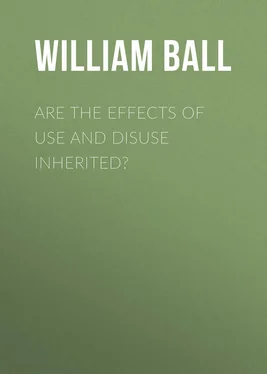William Ball - Are the Effects of Use and Disuse Inherited?
Здесь есть возможность читать онлайн «William Ball - Are the Effects of Use and Disuse Inherited?» — ознакомительный отрывок электронной книги совершенно бесплатно, а после прочтения отрывка купить полную версию. В некоторых случаях можно слушать аудио, скачать через торрент в формате fb2 и присутствует краткое содержание. Жанр: foreign_antique, foreign_prose, на английском языке. Описание произведения, (предисловие) а так же отзывы посетителей доступны на портале библиотеки ЛибКат.
- Название:Are the Effects of Use and Disuse Inherited?
- Автор:
- Жанр:
- Год:неизвестен
- ISBN:нет данных
- Рейтинг книги:5 / 5. Голосов: 1
-
Избранное:Добавить в избранное
- Отзывы:
-
Ваша оценка:
- 100
- 1
- 2
- 3
- 4
- 5
Are the Effects of Use and Disuse Inherited?: краткое содержание, описание и аннотация
Предлагаем к чтению аннотацию, описание, краткое содержание или предисловие (зависит от того, что написал сам автор книги «Are the Effects of Use and Disuse Inherited?»). Если вы не нашли необходимую информацию о книге — напишите в комментариях, мы постараемся отыскать её.
Are the Effects of Use and Disuse Inherited? — читать онлайн ознакомительный отрывок
Ниже представлен текст книги, разбитый по страницам. Система сохранения места последней прочитанной страницы, позволяет с удобством читать онлайн бесплатно книгу «Are the Effects of Use and Disuse Inherited?», без необходимости каждый раз заново искать на чём Вы остановились. Поставьте закладку, и сможете в любой момент перейти на страницу, на которой закончили чтение.
Интервал:
Закладка:
LACK OF EVIDENCE
The "direct proofs" of use-inheritance are not as plentiful as might be desired, it appears (pp. 24-28). This acknowledged "lack of recognized evidence" is indeed the weakest feature in the case, though Mr. Spencer would fain attribute this lack of direct proof to insufficient investigation and to the inconspicuous nature of the inheritance of the modification. But there is an almost endless abundance of conspicuous examples of the effects of use and disuse in the individual. How is it that the subsequent inheritance of these effects has not been more satisfactorily observed and investigated? Horse-breeders and others could profit by such a tendency, and one cannot help suspecting that the reason they ignore it must be its practical inefficacy, arising probably from its weakness, its obscurity and uncertainty or its non-existence.
INHERITED EPILEPSY IN GUINEA-PIGS
Brown-Séquard's discovery that an epileptic tendency artificially produced by mutilating the nervous system of a guinea-pig is occasionally inherited may be a fact of "considerable weight," or on the other hand it may be entirely irrelevant. Cases of this kind strike one as peculiar exceptions rather than as examples of a general rule or law. They seem to show that certain morbid conditions may occasionally affect both the individual and the reproductive elements or transmissible type in a similar manner; but then we also know that such prompt and complete transmission of an artificial modification is widely different from the usual rule. Exceptional cases require exceptional explanations, and are scarcely good examples of the effect of a general tendency which in almost all other cases is so inconspicuous in its immediate effects. Further remarks on this inherited epilepsy can be most conveniently introduced later on in connection with Darwin's explanation of the inherited mutilation which it usually accompanies, but which Mr. Spencer does not mention.
INHERITED INSANITY AND NERVOUS DISORDERS
Mr. Spencer infers that, because insanity is usually hereditary, and insanity can be artificially produced by various excesses, therefore this artificially-produced insanity must also be hereditary (p. 28). Direct evidence of this conclusion would be better than a mere inference which may beg the very question at issue. That the liability to insanity commonly runs in families is no proof that strictly non-inherited insanity will subsequently become hereditary. I think that theories should be based on facts rather than facts on theories, especially when those facts are to be the basis or proof of a further theory.
Mr. Spencer also points out that he finds among physicians "the belief that nervous disorders of a less severe kind are inheritable" – a general belief which does not necessarily include the transmission of purely artificially-produced disorders, and so misses the point which is really at issue. He proceeds, however, to state more definitely that "men who have prostrated their nervous systems by prolonged overwork or in some other way, have children more or less prone to nervousness." The following observations will, I think, warrant at least a suspension of judgment concerning this particular form of use-inheritance.
(1) The nervousness is seen in the children at an early age, although the nervous prostration from which it is supposed to be derived obviously occurs in the parent at a much later period of life. This change in time is contrary to the rule of inheritance at corresponding periods; and, together with the unusual promptness and comparative completeness of the inheritance, it may indicate a special injury or deterioration of the reproductive elements rather than true inheritance. The healthy brain of early life has failed to transmit its robust condition. Is use-inheritance, then, only effective for evil? Does it only transfer the newly-acquired weakness, and not the previous long-continued vigour?
(2) Members of nervous families would be liable to suffer from nervous prostration, and by the ordinary law of heredity alone would transmit nervousness to their children.
(3) The shattered nerves or insanity resulting from alcoholic and other excesses, or from overwork or trouble, are evidently signs of a grave constitutional injury which may react upon the reproductive elements nourished and developed in that ruined constitution. The deterioration in parent and child may often display itself in the same organs – those probably which are hereditarily weakest. Acquired diseases or disorders thus appear to be transmitted, when all that was conveyed to the offspring was the exciting cause of a lowered vitality or disordered action, together with the ancestral liability to such diseases under such conditions.
(4) Francis Galton says that "it is hard to find evidence of the power of the personal structure to react upon the sexual elements, that is not open to serious objection." Some of the cases of apparent inheritance he regards as coincidence of effect. Thus "the fact that a drunkard will often have imbecile children, although his offspring previous to his taking to drink were healthy," is an "instance of simultaneous action," and not of true inheritance. "The alcohol pervades his tissues, and, of course, affects the germinal matter in the sexual elements as much as it does that in his own structural cells, which have led to an alteration in the quality of his own nerves. Exactly the same must occur in the case of many constitutional diseases that have been acquired by long-continued irregular habits." 13 13 Contemporary Review , December, 1875, p. 92.
INDIVIDUAL AND TRANSMISSIBLE TYPE NOT MODIFIED ALIKE BY THE DIRECT EFFECT OF CHANGED HABITS OR CONDITIONS
Mr. Spencer finds it hard to believe that the modifications conveyed to offspring are not identical in tendency with the changes effected in the parent by altered use or habit (pp. 23-25, 34). But it is perfectly certain that the two sets of effects do not necessarily correspond. The effect of changed habits or conditions on the individual is often very far from coinciding with the effects on the reproductive elements or the transmissible type. The reproductive system is "extremely sensitive" to very slight changes, and is often powerfully affected by circumstances which otherwise have little effect on the individual ( Origin of Species , p. 7). Various animals and plants become sterile when domesticated or supplied with too much nourishment. The native Tasmanians have already become extinct from sterility caused by greatly changed diet and habits. If, as Mr. Spencer teaches, continued culture and brain-work will in time produce lessened fertility or comparative sterility, we may yet have to be careful that intellectual development does not become a species of suicide, and that the culture of the race does not mean its extinction – or at least the extinction of those most susceptible of culture.
The reproductive elements are also disturbed and modified in innumerable minor ways. Changed conditions or habits tend to produce a general "plasticity" of type, the "indefinite variability" thus caused being apparently irrelevant to the change, if any, in the individual. 14 14 See Origin of Species , pp. 5-8. "Changed conditions induce an almost indefinite amount of fluctuating variability, by which the whole organization is rendered in some degree plastic" ( Descent of Man , p. 30). It also appears that "the nature of the conditions is of subordinate importance in comparison with the nature of the organism in determining each particular form of variation; – perhaps of not more importance than the nature of the spark, by which a mass of combustible matter is ignited, has in determining the nature of the flames" ( Origin of Species , p. 8).
Интервал:
Закладка:
Похожие книги на «Are the Effects of Use and Disuse Inherited?»
Представляем Вашему вниманию похожие книги на «Are the Effects of Use and Disuse Inherited?» списком для выбора. Мы отобрали схожую по названию и смыслу литературу в надежде предоставить читателям больше вариантов отыскать новые, интересные, ещё непрочитанные произведения.
Обсуждение, отзывы о книге «Are the Effects of Use and Disuse Inherited?» и просто собственные мнения читателей. Оставьте ваши комментарии, напишите, что Вы думаете о произведении, его смысле или главных героях. Укажите что конкретно понравилось, а что нет, и почему Вы так считаете.












